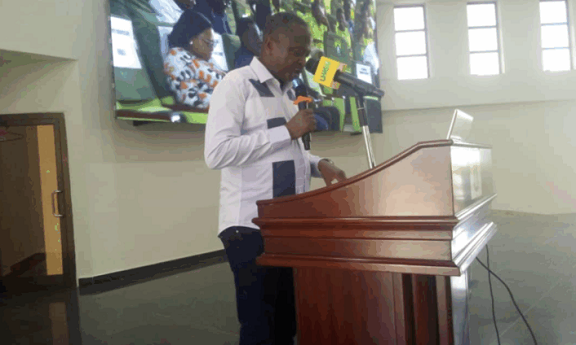The Narcotics Control Commission (NACOC) has disclosed that 292 million people globally abused substances in 2022, representing a 20 percent increase over the past decade, according to data from the United Nations Office on Drugs and Crime (UNODC).
Mr. Sylvester Yaw Adu, Director of Drug Demand Reduction at NACOC, made the revelation during the 2025 World Drug Day commemoration in Ho, organized by UHAS Basic School in collaboration with NACOC.
The event, themed “Break the Cycle: Empowering the Youth Against Drug Abuse,” brought together 13 basic schools from the Ho Municipality.
Mr. Adu highlighted that the alarming global rise in substance abuse reflects a growing challenge also visible in Ghana, particularly among the youth.
He noted with concern the increasing misuse of prescription opioids—popularly referred to as “Red”—which have recently made headlines due to their widespread abuse.
“Substance abuse doesn’t only affect the user. It impacts families, communities, and even future generations. It strains household finances, destroys relationships, and imposes heavy treatment costs on already struggling families,” he said.
He warned that substance abuse often fuels organized crime, terrorism, violence, and corruption, leaving communities trapped in cycles of poverty and underdevelopment.
Mr. Adu emphasised that prevention is the most cost-effective and powerful tool in the fight against drug abuse.
He cited evidence showing that communities where youth receive prevention and life skills training tend to be more resilient to substance abuse.
Similarly, parenting skills programs that strengthen family bonds have proven effective in keeping children in school and away from drugs.
“Let us invest in prevention. Prevention saves lives, communities, and futures. Poverty and despair are key risk factors for substance abuse. Without intervention, the cycle continues,” he said.
He added that individuals struggling with substance use are often exploited by criminal organizations, drawn into illegal activities to sustain their addiction.
NACOC, he said, remains committed to breaking the cycle through nationwide prevention education, targeting schools, faith-based institutions, corporate bodies, and local communities.
He noted that the Commission also provides free outreach services, brief interventions, and support referrals, while offering training and technical assistance to rehabilitation centres.
“We are working to ensure that the National Rehabilitation Centre becomes fully operational to provide quality, evidence-based treatment for substance use disorders,” he added.
Prof. Frank Edwin, Pro-Vice Chancellor of the University of Health and Allied Sciences (UHAS), who was guest of honour, expressed concern over rising alcohol use among adolescents.
He cited a recent study in the Ashanti Region which revealed that nearly half of surveyed students had tried alcohol, often introduced by senior students.
“Young people are being misled into thinking alcohol boosts confidence, improves study performance, and reduces stress. These beliefs are false, yet they’re widely promoted among students,” he warned.
He explained that early exposure to drugs and alcohol can lead to addiction, with long-term consequences on mental and physical health.
He urged parents to be vigilant and proactive in educating their children about the dangers of drug use.
“Parents must engage in open dialogue with their children. If your child shows unusual behavior, take interest. It could be a sign of exposure to substances,” he advised.
Prof. Evelyn Korkor Ansah, Board Chairperson of UHAS Basic School, stressed the importance of collaborative action to address drug abuse.
She advocated for the creation of safe environments within schools, where students with challenges can feel comfortable seeking help.
“We must build support systems and student-led clubs to promote drug awareness and peer advocacy,” she said.
Mr. Seth Korgah, Head of UHAS Basic School, revealed that drug use is becoming more common in Ho and surrounding areas, prompting the school’s proactive stance.
He said students have already begun writing poems and plays to campaign against drug abuse.
“This is our way of protecting the children’s future. We believe this partnership with NACOC and other stakeholders is making a real impact,” he said.
Mr. Korgah urged the Ghana Education Service (GES) to establish a dedicated unit for drug prevention within schools and incorporate substance abuse education into the academic curriculum and extracurricular programs.
“We’re taking this message from schools to churches and communities, especially during career days. We tell the youth plainly—drug use will derail your future. Let’s make this a national campaign,” he stressed.
The 2025 International Day Against Drug Abuse and Illicit Trafficking, also known as World Drug Day, was observed under the global theme: “Breaking the Chains: Prevention, Treatment, and Recovery for All.”
The programme saw collaboration between NACOC, Ghana Health Service, UHAS School of Medicine, Ho Teaching Hospital, UHAS School of Pharmacy, Department of Social Welfare, Ghana Police Service, and the Ghana Education Service.
GNA





